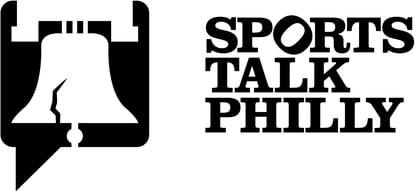Periodically, I am asked to do the three-star selection at Flyers home games at the Wells Fargo Center. The process is harder than it may look.
In order to relay the information to everyone who needs it, the selection sheet has to be handed in with a few minutes left in the third period. The sheet is brought back to the selector if the score changes in a significant way such as a subsequent game-tying goal in a one-goal game at the time of the picks. Ordinarily, however, if you want to change a selection, you have to relay the change to press box steward Sean Jack with sufficient time for him to get the change over Lou Nolan at the scorer's desk.
By sheer happenstance, roughly 75 percent of the games where I've picked the three stars last year and this year have gone to overtime or a shootout, which often means turning the sheet in with a "game-winning goal scorer" and/or "winning goalie" instruction. Thereafter, you hope the winning goal gets scored by a player who has had a good game overall and didn't just score a shootout goal after an otherwise unremarkable game.
Last-moment changes can otherwise be tough to request because, as a writer, you are generally focused on having most of your game story — sans quotes and perhaps a few details you want to double-check before publication — as the game ends and then hustling over immediately to the press box elevator to get down to event level for player interviews in the locker room and the coach's press conference. If you take time to go over to Sean and explain the changes, you'll miss the elevator and have to wait for it to return. Changing the three stars is second on the priority list.
Selections can also be changed when you get back upstairs after media availability. However, it's not usually worth creating the extra work for other people. The players themselves rarely care about it; they just care about the team's win or loss.
I've only asked for a postgame change once. I did it in a case where the original selection got misidentifed. When the Flyers played the Dallas Stars in October of this season, I selected Dallas captain Jamie Benn on the three-stars list, but I just scrawled "Benn – 14" and it must have looked like a "Benn – 24" because it was announced and listed on the initial final game sheet as a selection of Jordie Benn, Jamie's defenseman brother and teammate.
There have been two other times when I contemplated asking for a postgame change, but decided to leave the list as it was when I turned it in during the final 4-5 minutes of regulation. It just happened on Thursday night in fact, when the Flyers defeated the Minnesota Wild, 3-2.
At the time I turned in the sheet, Michal Neuvirth was having a decent night in net but not enough to bump someone else off the list on a night where the Flyers had taken and lost a pair of one-goal leads and then went ahead again. The goaltending of Neuvirth and opponent Devan Dubnyk were generally solid and both made some clutch saves, but they were not the "story of the game" up to that point.
Specific to Neuvirth, despite making some difficult saves — including two on Mikael Granlund — I felt he botched a preventable rebound with his glove on the sequence that led to Granlund's rebound goal that tied the score at 2-2. It didn't mean the goal was a terrible one or that Neuvirth wasn't playing well overall, but it was enough to have him down as my "fourth or fifth star" (which, of course, doesn't exist as a selection).
Then it happened…"it" being that Neuvirth made the most astonishing millimeter-margin (if that) saves I've ever seen, and the save was a win-preserving one at that with 2.6 seconds left on the clock. I contemplated requesting a change but decided to leave the list as it was before.
Why? Because in the final analysis, the miracle save could just as easily have been ruled a goal.
One camera angle seems to suggest that the puck hit right near the "B" in the Bauer imprint on the underside of the goalie's stick paddle before it dropped partially along the goal line and partially in the blue paint as Neuvirth immediately covered it with his glove. Add to that a second camera angle that shows the shot on a slightly diagonal trajectory and most of the paddle of Neuvirth's stick behind the goal line — but the puck disappearing from view, obscured by the top side of the paddle as Neuvirth turns the stick, at the critical moment — at the chance that the puck entirely crossed the goal line for perhaps one-hundreth of one second is quite plausible but impossible to definitely prove.
All other views were equally inconclusive — some not even clearly showing the puck hitting Neuvirth's stick. As a result, whichever call was made by the on-ice referee — goal or no goal — was going to be virtually impossible to overturn in the "Situation Room" in Toronto. It would have stood as a game-tying goal for the very same reason it stood as a win-preserving save. That's how close it truly was.
Neuvirth deserves huge kudos for even getting to the puck at all, much less how and when in the game he did it. I agonized after the game about whether to redo the three-star list. Then I went back again mentally to the second Minnesota goal. While one should never assume the rest of the game will play out the same way if such-and-such didn't happen, the second Minnesota goal was preventable adversity for the Flyers. Neuvirth fumbled a puck off his glove on a play he'd normally handle cleanly and the rebound went to a dangerous area where it was immediately pounced on and stashed home.
At the end of the night, Neuvirth more than atoned for making just one of a series of errors of commission — Radko Gudas getting stripped of the puck behind the net, Brandon Manning not covering anyone effectively in front — by the Flyers. The scales more than balanced, they tipped to Neuvirth being a hero. But if the ref had called Charlie Coyle's final shot a goal,all there would be was lamenting how Neuvirth had done everything he possibly could, but the replays weren't enough to reverse the goal call.
The final determination was out of Neuvirth's hands. Given that there was no way the referee could possibly have seen the puck cross the line (when not even a host of freeze-frame replays from various angles could prove it), the right call was made on the ice and also by the replay officials in Toronto to uphold it. The Flyers will most certainly take it.
As for the three stars, I seriously doubt Neuvirth cares one iota about whether he was retroactively picked as a game star after the game was over. Nor do his teammates. They all know what the save meant, appreciated it to the hilt and the team outcome is the bottom line.
That was also my reasoning on March 28 of last year in not retroactively putting Steve Mason as a star for making five saves in the final four-plus minutes of regulation, five more in overtime (the Flyers got outshot 5-0) — a few of the point-blank variety — as he stole the team a point on a night they got outshot by San Jose 44-18 and out-chanced by an equally wide margin. In the shootout, Mason stopped three of the first four shooters. The Flyers shooters went just 1-for-5, though, before San Jose fifth-round shooter Brent Burns scored to end the game.
The Flyers, however, had trailed for much of regulation — 1-0 and 2-1 in the first period, with the score holding until a mid-third period Claude Giroux power play goal tied the score. Now, Mason was certainly keeping his team close but his biggest heroics came after the three-star selection was turned in. I did pop over to Sean after the list was turned in and asked him to make Mason the first star if the Flyers won but it didn't feel right to do it if the Flyers lost in OT or via shootout.
So, in the end, the guy who I felt was the best player on the ice for either team that night ended up not even being one of the three stars — yes, it felt silly. On Thursday of this week, the game's ultimate biggest hero, Neuvirth, wasn't one either simply because of process and the vicissitudes of how 50-50 judgment calls by an official can go.
If you think picking three stars is a simple matter, guess again. The selections you'd make at home at the end of the night may very well vary from what you'd do if you had the official decision on your hands, given the process involved. I take the selections very seriously– it's an honor to be asked. It's also very easy to overthink it and second-guess yourself after the process. In the end, you have to go with your gut at the time the picks are turned in, and then leave it at that if you are on the fence about a change afterward.
Bill Meltzer is a columnist for Flyerdelphia. Follow him on Twitter @billmeltzer.







